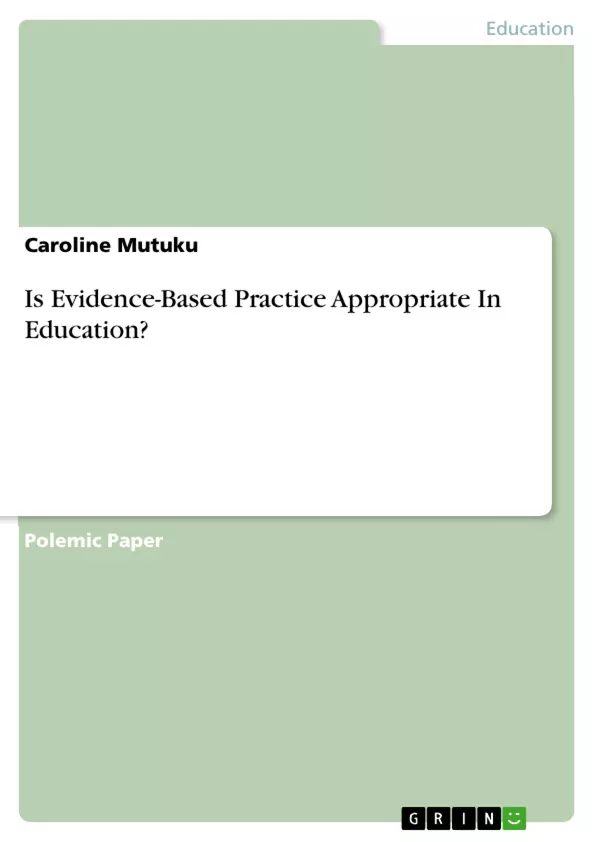Over the past few decades, educational transformation seems to have assumed a new dimension with evidence-based practice being at the core of this transformation. Currently, different countries have designed educational policies to incline the educational profession into evidence-based approach as it has been in the field of medicine. However, this issue encompasses immense controversy among policy makers and educators, as well as within educational research community. This controversy has emerged due to matters related to the significance of educational research in several aspects. First, educational research has been observed to be inadequate in developing a reliable educational knowledge that can be used by educational institutions and governments to develop appropriate educational policy. Secondly, educational research has been reported to be noncumulative and fragmented with numerous methodological faults. Thirdly, evidence-based practice in education is claimed to exhibit political dimensions. Finally, educational research encompasses ambiguity in definition. These are the issues in evidence-based practice that compromise its relevance and quality. On the other hand, it is apparent that there is a culture gulf between the precepts of research and the teaching profession. In this research paper, I will carry out a comprehensive literature review to answer the question; is evidence-based practice appropriate in education? To accomplish this, this research will present issues raised by evidence-based education. In addition, it will provide a critical analysis of the key models involved to demonstrate the culture gulf between the teaching profession and evidence-based practice.
Inhaltsverzeichnis (Table of Contents)
- Introduction
- Ambiguity in Defining Evidence-Based Practice
- Diverse Attributes of Professional Action
- Professional Judgment and Evidence-Based Education
- Obstacles to Evidence-Based Education
Zielsetzung und Themenschwerpunkte (Objectives and Key Themes)
This research paper aims to explore the appropriateness of evidence-based practice in education by conducting a comprehensive literature review. The paper examines the controversies surrounding the definition and implementation of evidence-based education, critically analyzes key models involved, and investigates the gap between research and the teaching profession.
- Ambiguity in defining evidence-based practice in education
- The role of professional judgment in evidence-based education
- The limitations of applying the casual and technological models of professional action to education
- The importance of considering the normative dimensions of education in evidence-based practice
- The need for a model of professional action that acknowledges practical wisdom beyond instrumental knowledge
Zusammenfassung der Kapitel (Chapter Summaries)
- Introduction: This chapter introduces the concept of evidence-based practice in education and highlights the controversies surrounding its implementation. It outlines the key issues that compromise the relevance and quality of evidence-based practice, such as the lack of reliable educational knowledge, the fragmented nature of educational research, and the political dimensions of evidence-based practice.
- Ambiguity in Defining Evidence-Based Practice: This chapter explores the ambiguity surrounding the definition and implications of evidence-based practice in education. It discusses different perspectives on the meaning of evidence-based practice, highlighting the debate between using empirically validated approaches versus incorporating outcomes in decision-making. The chapter also examines the controversy over who should be involved in decision-making and the challenges this presents in understanding the precepts of evidence-based education.
- Diverse Attributes of Professional Action: This chapter critically analyzes the assumptions underpinning the adoption of evidence-based practice in education. It argues that evidence-based practice, originating from medicine, assumes a scientific basis for all practices and overlooks the values of teaching practice. The chapter then examines two models of professional action, the casual model and the technological model, and explores their limitations in the context of education. It emphasizes the distinct nature of education as a symbolic mediated process and the difficulty of linking means and ends in a technological platform within the educational context.
- Professional Judgment and Evidence-Based Education: This chapter discusses the role of professional judgment in evidence-based practice and the differences between its application in medicine and education. It argues that professional judgment in education is informed by value judgments rather than technical judgments, as education is a non-casual practice with moral dimensions. The chapter then explores Dewey's theory of knowing, which emphasizes experience and the interaction between an individual and the environment, and its implications for understanding the role of research in educational practice. It concludes that research provides insights into possible relationships between actions and consequences, but tested recipes do not constitute professional action.
Schlüsselwörter (Keywords)
The key terms and focus topics of this text include evidence-based practice, education, professional judgment, professional action, casual model, technological model, Dewey theory, knowledge, experience, and the normative dimensions of education. These concepts explore the challenges and complexities of implementing evidence-based practice in the field of education, particularly in relation to the role of professional judgment, the applicability of various models of professional action, and the importance of considering the ethical and moral aspects of educational practice.
Frequently Asked Questions
What is the core debate surrounding evidence-based practice in education?
The debate centers on whether educational research is reliable enough to dictate policy and whether professional judgment is being overlooked in favor of scientific models.
Why is defining "evidence-based practice" in education difficult?
Ambiguity arises from conflicting perspectives: some focus on empirically validated approaches, while others emphasize using outcomes to inform specific local decisions.
How does the medical model of professional action differ from the educational model?
Medicine often relies on technical judgments, whereas education involves moral and value judgments, making it a symbolic and non-casual practice.
What are the limitations of the technological model in education?
The technological model assumes a direct link between means and ends, which is difficult to apply to the complex, mediated process of teaching.
What role does Dewey’s theory of knowing play in this research?
Dewey’s theory emphasizes that research provides insights into actions and consequences, but practical wisdom and experience remain essential for professional action.
- Arbeit zitieren
- Caroline Mutuku (Autor:in), 2018, Is Evidence-Based Practice Appropriate In Education?, München, GRIN Verlag, https://www.grin.com/document/433487



